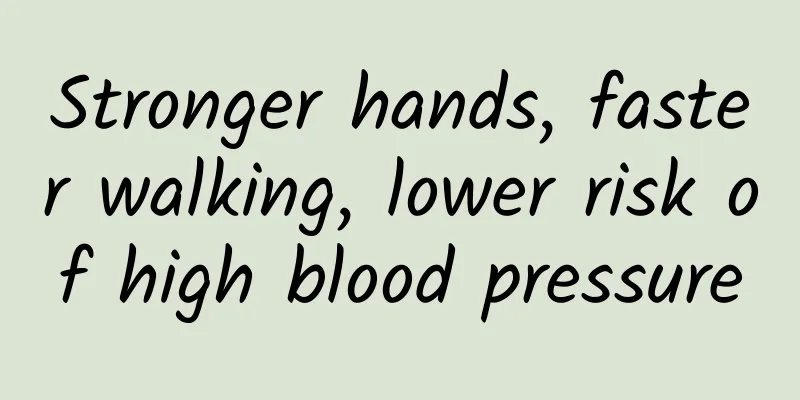Stronger hands, faster walking, lower risk of high blood pressure

|
Hypertension is the most common chronic disease and the main risk factor for cardiovascular and cerebrovascular diseases. It is one of the major public health issues facing the world. Actively looking for modifiable risk factors for hypertension is of great significance for preventing and controlling its occurrence and development, and reducing the harm caused by complications of hypertension. Genetic background, age and unhealthy lifestyle are recognized as the main risk factors for hypertension. Previous evidence has shown that physical activity and fitness training play an important role in preventing the occurrence and development of hypertension. Grip strength is a reliable indicator of skeletal muscle strength and systemic muscle status. Walking is the most common daily behavior and a simple and effective way of exercise, which is closely related to human health. However, the association between grip strength and walking speed and the risk of hypertension is still uncertain. Recently, the National Clinical Research Center for Kidney Diseases of Nanfang Hospital of Southern Medical University published a study titled "Combined handgrip strength and walking pace, genetic susceptibility, and incident hypertension: A prospective study in UK Biobank" in Scand J Med Sci Sports . The study showed that the stronger the handgrip strength and the faster the walking speed, the lower the risk of hypertension . Professor Qin Xianhui of the National Clinical Research Center for Kidney Diseases of Nanfang Hospital of Southern Medical University is the corresponding author of the article, and Dr. He Panpan is the first author. The study included more than 200,000 middle-aged and older participants from the UK Biobank study who did not have hypertension at baseline. The average handgrip strength was 24.0 and 40.0 kg for women and men, respectively. 10,447 (4.9%) participants reported a slow walking speed, 104,955 (49.0%) participants reported a moderate walking speed, and 98,812 (46.1%) participants reported a fast walking speed. After about 12 years of follow-up, 13,344 (6.2%) participants developed hypertension. Compared with participants with weak grip strength, that is, those in the first gender-specific group, the risk of new hypertension in the second, third, and fourth groups of grip strength was reduced by 20%, 26%, and 28%, respectively. At the same time, compared with participants who reported a slow walking speed, the risk of hypertension in participants with an average or fast walking speed was significantly reduced by 48% and 57%, respectively. Further joint analysis showed that compared with participants who walked slowly and had weak grip strength, participants with strong grip strength and faster walking speed had a significantly lower risk of hypertension by 64%. In addition, this study divided the participants into three groups according to their genetic risk of hypertension: low, medium, and high. The results showed that participants with the lowest genetic risk of hypertension, the strongest grip strength, and the fastest walking speed had the lowest risk of hypertension. Grip strength and walking speed reflect the state and function of human muscles and are easy to measure and evaluate in daily life. Our previous studies have also found that people with strong grip strength and fast walking speed have a lower risk of chronic kidney disease and dementia. Therefore, grip strength and walking speed are important direct indicators of overall health status and aging. For the general population, in the absence of clear clinical indications, they can assess their overall health status through their own grip strength and walking speed, and then maintain and promote their health through self-healthy behaviors, including: no smoking, good exercise (get moving), good sleep (7-9 hours a day), and good diet (3 more: fish, vegetables, fruits; 2 less: red meat, processed meat), that is, 3 good and 1 no, to achieve a self-driven internal cycle of self-health. Therefore, our series of research results emphasize that actively paying attention to health status and actively improving health levels by evaluating simple health indicators such as grip strength and walking speed is an important way to promote self-health management and achieve proactive health! References: He P, Gan X, Ye Z, Liu M, Zhou C, Wu Q, Zhang Y, Yang S, Zhang Y, Qin X. Combined handgrip strength and walking pace, genetic susceptibility, and incident hypertension: A prospective study in UK Biobank. Scand J Med Sci Sports . 2023;33(6):989-999. Editor | He Panpan Xianghao Audit | Qin Xianhui Reprint: Please contact us and indicate the source. Kidney Health Promotion Study A small step in scientific communication is a big step in healthy living! Pay attention to the whole chain of kidney disease prevention and control strategies, share the latest research results and dynamics of the Kidney Health Promotion Research Group, open, cooperative, sharing, and win-win! Welcome everyone to subscribe, criticize and correct! |
>>: Conch, abalone, razor clams, clams, shellfish, eat them wisely
Recommend
Quantitative analysis of remaining opportunities in 2C Internet
Winter is here. The term "capital winter&quo...
What are the advantages of dried durian? How to eat dried durian
Dried durian is rich in protein, vitamins and min...
What causes bleeding a week before period?
For women, the monthly visit of menstruation is r...
The importance of a girl's first time
A woman’s first time is very important. The woman...
Is your sleep "junk sleep"? It is said to be more terrible than insomnia...
This article was reviewed by Zhao Wei, MD, associ...
Can you really drink red wine during menstruation?
Red wine is made from grapes and is a kind of fru...
What to do if inflammation recurs during pregnancy
Judging from the incidence rate of gynecological ...
How to guide parents to read with their children at home? What are the benefits of parent-child reading?
Reading can enrich our knowledge. Reading more go...
What is the best way to stick tiles when they fall off? What mop is good and clean for mopping tiles?
Sometimes life can bring us "little surprise...
What to do if the green radish withers in winter? How to water the green radish if it withers in winter
The green radish is a large evergreen vine native...
They are really brothers in distress. What should we do if we meet them?
As we all know, things have a relationship of mut...
I fell down during early pregnancy_I accidentally fell down during pregnancy
Women need to be very careful during the period w...
Can Jindaconin be used to rub the vulva?
As we all know, the handling method of medicines ...
Here’s what you should know about the COVID-19 vaccine...
appendix: 1. I have some more questions, I will w...
How many false labor contractions a day are normal in late pregnancy?
False labor will not cause pain, which is the opp...









